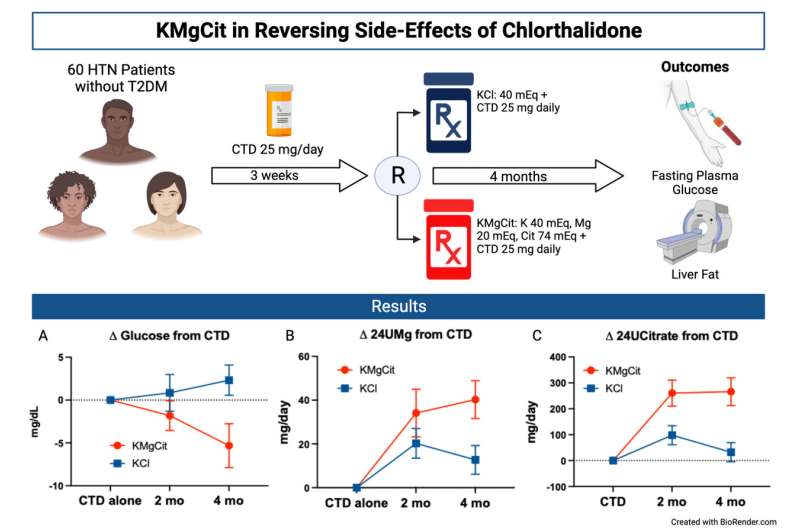This article has been reviewed according to Science X's editorial process and policies. Editors have highlighted the following attributes while ensuring the content's credibility:
fact-checked
peer-reviewed publication
trusted source
proofread
Supplement lowers risk of higher glucose caused by blood-pressure drug, researchers find

A dietary supplement developed by a UT Southwestern Medical Center researcher significantly reduced high blood sugar caused by a diuretic used to lower blood pressure while also correcting electrolyte imbalances, UTSW researchers report. The findings, published in Hypertension, could offer a solution for the serious side effects associated with this class of drugs.
"When patients take a medication, they want to treat one disease and not cause another. These findings suggest we may be able to reduce the risk of elevated blood sugar caused by thiazide diuretics with a simple supplement," said Wanpen Vongpatanasin, M.D., Director of the Hypertension Section in the Division of Cardiology at UT Southwestern. Dr. Vongpatanasin co-led the study with Charles Pak, M.D. Both are Professors of Internal Medicine and in the Charles and Jane Pak Center for Mineral Metabolism and Clinical Research.
Millions of Americans take thiazide diuretics, a class of medications used to treat high blood pressure, a risk factor for cardiovascular disease. Although these drugs are very effective, Dr. Vongpatanasin said, they come with significant side effects, including reduced levels of the electrolyte potassium in the blood; higher cholesterol, triglycerides, and other circulating lipids; and elevated glucose (blood sugar), a precursor to Type 2 diabetes.
The increase in glucose prompted by these drugs has long been attributed to the decrease in potassium levels. Although low potassium is effectively treated with potassium chloride (KCl) supplements, Dr. Vongpatanasin explained, they don't seem to affect glucose levels.

Thiazide diuretics also can reduce levels of magnesium, another important electrolyte, in blood. To help solve this problem, UT Southwestern researchers previously tested a supplement developed by Dr. Pak that combines potassium, magnesium, and citrate—an acidic compound found in fruits and vegetables. After administering this supplement to patients on thiazide diuretics for three weeks, the researchers found it to be effective at raising potassium and magnesium levels. However, that study was too short to examine the supplement's effects on glucose.
A randomized, double-blind study was conducted on 60 patients taking the thiazide diuretic chlorthalidone for 16 weeks, with half also receiving the combination supplement KMgCit and the other half supplemented only with KCl. During an initial three-week period when patients took the diuretic but didn't take the supplements, both groups experienced significant reductions in potassium and magnesium and increases in fasting glucose levels.
However, once the patients began supplementation, those on KCl increased their potassium levels, and those on KMgCit increased both potassium and magnesium levels. Although glucose measurements stayed high for the KCl group, they dipped an average of 7.9 milligrams per deciliter for the KMgCit group—a significant reduction.
Although it's unclear which component in the combination supplement lowered glucose, previous studies have shown that deficiencies in magnesium can have wide-ranging negative metabolic effects. Future studies will examine the effects of magnesium and citrate separately, Dr. Vongpatanasin said, as well as confirm these effects in more patients on thiazide diuretics for longer durations.
More information: Wanpen Vongpatanasin et al, Potassium Magnesium Citrate Is Superior to Potassium Chloride in Reversing Metabolic Side Effects of Chlorthalidone, Hypertension (2023). DOI: 10.1161/HYPERTENSIONAHA.123.21932





















